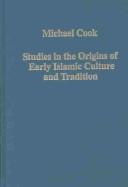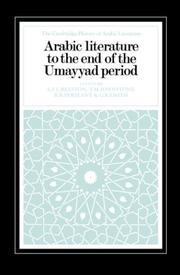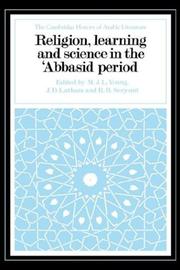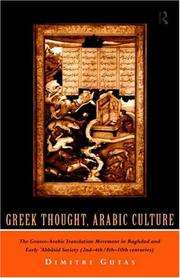| Listing 1 - 10 of 10 |
Sort by
|
Book
ISBN: 2727400985 9782727400981 Year: 1984 Publisher: Paris: Sindbad,
Abstract | Keywords | Export | Availability | Bookmark
 Loading...
Loading...Choose an application
- Reference Manager
- EndNote
- RefWorks (Direct export to RefWorks)
Islamic civilization --- Islamic Empire --- Intellectual life --- Islamic civilization. --- Intellectual life. --- Islamic Empire - Intellectual life
Book
ISBN: 9781479899265 1479899267 Year: 2019 Publisher: New York : New York Univeristy Press,
Abstract | Keywords | Export | Availability | Bookmark
 Loading...
Loading...Choose an application
- Reference Manager
- EndNote
- RefWorks (Direct export to RefWorks)
The Excellence of the Arabs is a spirited defense of Arab identity-its merits, values, and origins-at a time of political unrest and fragmentation, written by one of the most important scholars of the early Abbasid era. In the cosmopolitan milieu of Baghdad, the social prestige attached to claims of being Arab had begun to decline. Although his own family originally hailed from Merv in the east, Ibn Qutaybah locks horns with those members of his society who belittled Arabness and vaunted the glories of Persian heritage and culture. Instead, he upholds the status of Arabs and their heritage in the face of criticism and uncertainty. The Excellence of the Arabs is in two parts. In the first, Arab Preeminence, which takes the form of an extended argument for Arab privilege, Ibn Qutaybah accuses his opponents of blasphemous envy. In the second, The Excellence of Arab Learning, he describes the fields of knowledge in which he believed pre-Islamic Arabians excelled, including knowledge of the stars, divination, horse husbandry, and poetry. And by incorporating extensive excerpts from the poetic heritage-"the archive of the Arabs"-Ibn Qutaybah aims to demonstrate that poetry is itself sufficient corroboration of Arab superiority. Eloquent and forceful, The Excellence of the Arabs addresses a central question at a time of great social flux at the dawn of classical Muslim civilization: what did it mean to be Arab?
Book
ISBN: 9004093494 9004452435 9789004093492 9789004452435 Year: 1991 Volume: 10 Publisher: Leiden New York E.J. Brill
Abstract | Keywords | Export | Availability | Bookmark
 Loading...
Loading...Choose an application
- Reference Manager
- EndNote
- RefWorks (Direct export to RefWorks)
This book describes Socrates as he was depicted in medieval Arabic literature. The body of anecdotes, sayings and evaluations of Socrates existent in Arabic literature leads one to search for an explanation for the popularity of this ancient, Greek, pagan philosopher. The author argues that Socrates played a role of legitimizing authority in the religious controversies between Christians and Muslims on the one hand and between the more rationalistic minded Muslims and the more traditionalistic ones on the other hand. Thus, three approaches are encountered: those belonging to the non-fundamentalistic stream in Islam refer to Socrates as a prophet, historians such as ibn Fātik or ibn Abī Usaib'ah, who relate to Socrates as an exemplary personality with tacit Islamic qualities. The third approach is that of orthodox writers such as al-Ghazālī who attack Socrates as a non-believer.
Socrates --- Islamic Empire --- Empire islamique --- Intellectual life --- Vie intellectuelle --- Socrates. --- #GROL:SEMI-1<297> --- Socrate --- Socrates Constantinopolitanus Scholasticus --- Intellectual life. --- Islamic Empire - Intellectual life. --- Sokrates --- Islam --- Literatur

Abstract | Keywords | Export | Availability | Bookmark
 Loading...
Loading...Choose an application
- Reference Manager
- EndNote
- RefWorks (Direct export to RefWorks)
Beschaving [Mohammedaanse ] --- Civilisation islamique --- Civilisation musulmane --- Civilization [Islamic ] --- Culture islamique --- Culture musulmane --- Islam--Civilisation --- Islamic civilization --- Muslim civilization --- Civilization, Islamic --- Islamic Empire --- Intellectual life --- Islamic civilization. --- Intellectual life. --- Islam -- Civilisation --- Mohammedaanse beschaving --- Islamic Empire - Intellectual life
Book
ISSN: 12622850 ISBN: 9782745329530 2745329537 Year: 2016 Volume: 142 Publisher: Paris Editions Champion
Abstract | Keywords | Export | Availability | Bookmark
 Loading...
Loading...Choose an application
- Reference Manager
- EndNote
- RefWorks (Direct export to RefWorks)
Abbasids --- Philosophy, Arab --- Philosophy, Chinese --- History --- Islamic Empire --- China --- Intellectual life --- Civilization --- Religion --- Philosophy, Arab - History --- Philosophy, Chinese - 221 B.C.-960 A.D. --- Islamic Empire - History - 750-1258 --- Islamic Empire - Intellectual life --- Islamic Empire - Civilization --- Islamic Empire - Religion --- China - History - Tang dynasty, 618-907 --- China - Intellectual life - 221 B.C.-960 A.D. --- China - Civilization - 221 B.C.-960 A.D. --- China - Religion
Book
ISSN: 09292403 ISBN: 9789004413207 9004413200 9789004431867 9789004431874 9004431861 900443187X 9004413219 9789004413214 Year: 2020 Volume: 172/1-2 Publisher: Leiden : Brill,
Abstract | Keywords | Export | Availability | Bookmark
 Loading...
Loading...Choose an application
- Reference Manager
- EndNote
- RefWorks (Direct export to RefWorks)
Knowledge and Education in Classical Islam: Religious Learning between Continuity and Change is a pioneering collection of essays on the historical developments, ideals, and practices of Islamic learning and teaching in the formative and classical periods of Islam (i.e., from the seventh to fifteenth centuries CE). Based on innovative and philologically sound primary source research, and utilizing the most recent methodological tools, this two volume set sheds new light on the challenges and opportunities that arise from a deep engagement with classical Islamic concepts of knowledge, its production and acquisition, and, of course, learning. Learning is especially important because of its relevance to contemporary communities and societies in our increasingly multicultural, “global” civilizations, whether Eastern or Western. Contributors: Hosn Abboud, Sara Abdel-Latif, Asma Afsaruddin, Shatha Almutawa, Nuha Alshaar, Jessica Andruss, Mustafa Banister, Enrico Boccaccini, Sonja Brentjes, Michael Carter, Hans Daiber, Yoones Dehghani Farsani, Yassir El Jamouhi, Nadja Germann, Antonella Ghersetti, Sebastian Günther, Mohsen Haredy, Angelika Hartmann, Paul L. Heck, Asma Hilali, Agnes Imhof, Jamal Juda, Wadad Kadi, Mehmet Kalayci, Alexey Khismatulin, Todd Lawson, Mariana Malinova, Ulrika Mårtensson, Christian Mauder, Jane Dammen McAuliffe, Maryam Moazzen, Angelika Neuwirth, Jana Newiger, Luca Patrizi, Lutz Richter-Bernburg, Ali Rida Rizek, Mohammed Rustom, Jens Scheiner, Gregor Schoeler, Steffen Stelzer, Barbara Stowasser, Jacqueline Sublet, and Martin Tamcke.
Islamic civilization --- Islamic education --- Islamic religious education --- History. --- Islamic Empire --- Intellectual life. --- Islam --- Islamic civilization. --- Islamic education. --- Islamic religious education. --- Study and teaching. --- Islamic Empire. --- Civilization, Islamic --- Muslim civilization --- Civilization --- Civilization, Arab --- Islamic studies --- Islamic civilization - History. --- Islamic education - History. --- Islamic religious education - History. --- Islamic Empire - Intellectual life.

ISBN: 0521240158 9780521240154 9780511659409 9780521126212 Year: 1983 Publisher: Cambridge ; New York, NY : Cambridge University Press,
Abstract | Keywords | Export | Availability | Bookmark
 Loading...
Loading...Choose an application
- Reference Manager
- EndNote
- RefWorks (Direct export to RefWorks)
Arabic literature --- Littérature arabe --- History and criticism. --- Histoire et critique --- Islamic Empire --- Empire islamique --- Intellectual life. --- Vie intellectuelle --- History and criticism --- Intellectual life --- -Arabic literature --- -Middle Eastern literature --- North African literature --- -Arab countries --- Arab Empire --- Empire, Islamic --- Middle East --- Muslim Empire --- History --- -History and criticism --- -Intellectual life --- Littérature arabe --- Arabic literature - To 622 - History and criticism --- Arabic literature - 622-750 - History and criticism --- Islamic Empire - Intellectual life

ISBN: 0521327636 9780521327633 9781139424912 9780521028875 Year: 1990 Publisher: Cambridge ; New York, NY : Cambridge University Press,
Abstract | Keywords | Export | Availability | Bookmark
 Loading...
Loading...Choose an application
- Reference Manager
- EndNote
- RefWorks (Direct export to RefWorks)
Civilization, Islamic --- Muslim civilization --- Civilization --- Civilization, Arab --- Islamic Empire --- -Arab countries --- Arab Empire --- Empire, Islamic --- Middle East --- Muslim Empire --- Intellectual life --- History --- Beschaving [Mohammedaanse ] --- Civilisation islamique --- Civilisation musulmane --- Civilization [Islamic ] --- Culture islamique --- Culture musulmane --- Islam--Civilisation --- Islamic civilization --- Littérature arabe --- Civilization, Islamic. --- Islam -- Civilisation --- Mohammedaanse beschaving --- Littérature arabe --- Intellectual life. --- Islamic civilization. --- Arabic literature --- Learning and scholarship --- History and criticism. --- Histoire et critique --- Empire islamique --- Vie intellectuelle --- Islamic Empire - Intellectual life.
Multi
ISBN: 9781108721745 9781108496605 9781108634274 110875855X 1108634273 1108496601 1108721745 Year: 2019 Publisher: Cambridge : Cambridge University Press,
Abstract | Keywords | Export | Availability | Bookmark
 Loading...
Loading...Choose an application
- Reference Manager
- EndNote
- RefWorks (Direct export to RefWorks)
The caliphs and sultans who once ruled the Muslim world were often assisted by powerful Jewish, Christian, Zoroastrian, and other non-Muslim state officials, whose employment occasioned energetic discussions among Muslim scholars and rulers. This book reveals those discussions for the first time in all their diversity, drawing on unexplored medieval sources in the realms of law, history, poetry, entertaining literature, administration, and polemic. It follows the discourse on non-Muslim officials from its beginnings in the Umayyad empire (661-750), through medieval Iraq, Egypt, Syria, and Spain, to its apex in the Mamluk period (1250-1517). Far from being an intrinsic part of Islam, views about non-Muslim state officials were devised, transmitted, and elaborated at moments of intense competition between Muslim and non-Muslim learned elites. At other times, Muslim rulers employed non-Muslims without eliciting opposition. The particular shape of the Islamic discourse on this issue is comparable to analogous discourses in medieval Europe and China.
Islam --- Islam and state --- Relations --- Islamic Empire --- Politics and government --- Intellectual life --- Officials and employees --- History of Asia --- anno 800-1199 --- anno 700-799 --- anno 1200-1499 --- Arab countries --- Arab Empire --- Empire, Islamic --- Middle East --- Muslim Empire --- Intellectual life. --- Politics and government. --- Officials and employees. --- History --- E-books --- Mosque and state --- State and Islam --- State, The --- Ummah (Islam) --- Islam - Relations --- Islam and state - Islamic Empire --- Islamic Empire - Politics and government --- Islamic Empire - Intellectual life --- Islamic Empire - Officials and employees

ISBN: 1282816292 1283707721 9786612816291 1134926359 0203017439 9781134926350 0415061326 0415061334 9780415061322 9780415061339 9780203017432 9781134926305 9781134926343 1134926340 Year: 1998 Publisher: London ; New York, NY : Routledge,
Abstract | Keywords | Export | Availability | Bookmark
 Loading...
Loading...Choose an application
- Reference Manager
- EndNote
- RefWorks (Direct export to RefWorks)
From the middle of the eighth century to the tenth century, almost all non-literary and non-historical secular Greek books, including such diverse topics as astrology, alchemy, physics, botany and medicine, that were not available throughout the eastern Byzantine Empire and the Near East, were translated into Arabic.Greek Thought, Arabic Culture explores the major social, political and ideological factors that occasioned the unprecedented translation movement from Greek into Arabic in Baghdad, the newly founded capital of the Arab dynasty of the 'Abbasids', during the first two
Civilization, Arab --- History. --- Greek language --- Translating and interpreting --- Middle East --- Regions & Countries - Asia & the Middle East --- History & Archaeology --- Classical languages --- Indo-European languages --- Classical philology --- Greek philology --- Arab civilization --- Civilization, Semitic --- Islamic civilization --- Interpretation and translation --- Interpreting and translating --- Language and languages --- Literature --- Translation and interpretation --- Translators --- Greek influences. --- Translating into Arabic --- Greek influences --- History --- Translating --- Islamic Empire --- Intellectual life. --- Translating into Arabic&delete& --- Abbasids --- Islamic philosophy --- Civilisation arabe --- Grec (Langue) --- Traduction et interprétation --- ʻAbbāssides --- Philosophie islamique --- Influence grecque --- Traduction en arabe --- Histoire --- Empire islamique --- Intellectual life --- Vie intellectuelle --- Civilization, Arab. --- Civilization, Arab - Greek influences. --- Greek language. --- Translating and interpreting. --- History of philosophy --- Islam --- Classical Greek language --- History of civilization --- anno 500-1199 --- Greek language - Translating into Arabic - History. --- Translating and interpreting - Islamic Empire. --- Islamic Empire - Intellectual life. --- Islamic Empire - History - 750-1258.
| Listing 1 - 10 of 10 |
Sort by
|

 Search
Search Feedback
Feedback About
About Help
Help News
News